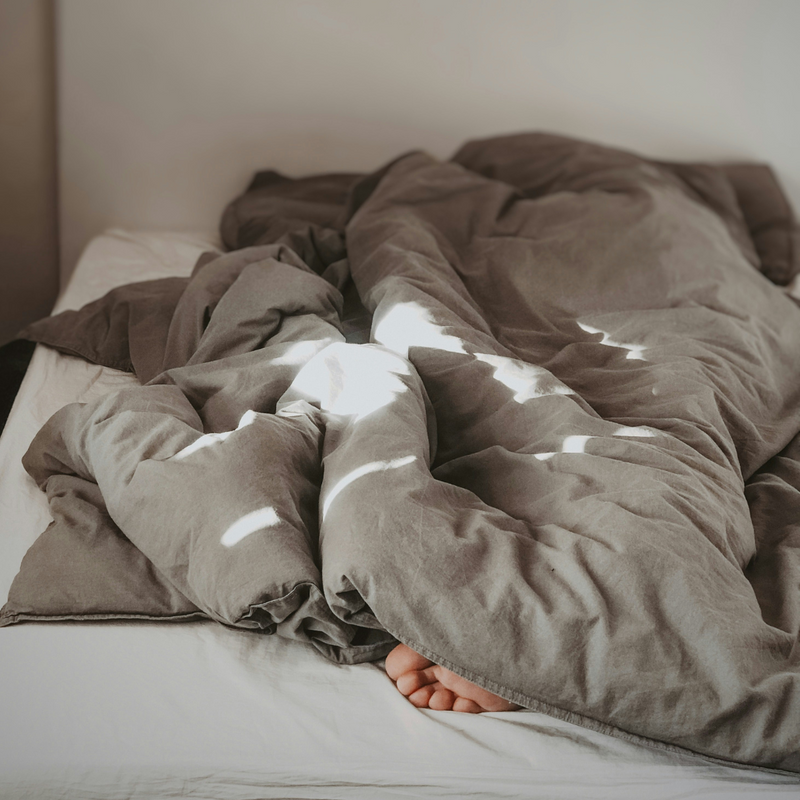

Slumber Science: Are You Sabotaging Your Sleep?

For most of us, the moment we close our eyes and drift off, the realm of sleep becomes cloaked in mystery. We're well aware of its importance, yet many of us struggle to attain that perfect, uninterrupted slumber night after night.
If you often find yourself asking "why am i so tired?!," this is for you.
The factors behind a fitful night's sleep often extend beyond just a hard mattress or noisy neighbors.
It's tied into how sleep works, how our daily routines and habits impact the delicate balance required to get quality sleep.
We'll cover:
✔️ Sleep stages & why they matter
✔️ What you might be doing to sabotage your sleep
✔️ A foundation for better rest

Sleep can be categorized into two main types:
non-REM (NREM), which includes 4 stages, and REM sleep.
NREM Stages 1 & 2:
- Duration: Stage 1 is brief, only lasting a few minutes, while Stage 2 lasts about 20 minutes.
- Function: These stages act as a transition from wakefulness to deeper sleep. During this period, the body prepares itself for deep sleep.
- Characteristics: In Stage 1, there's light sleep with slow eye movement and reduced muscle activity. People might experience sudden muscle contractions called hypnic jerks. As one enters Stage 2, eye movement stops, brain waves slow down but have occasional bursts of rapid waves known as sleep spindles. The heart rate begins to slow, and body temperature drops.
NREM Stages 3 & 4 (Deep Sleep or Slow Wave Sleep):
- Duration: Lasts 20-40 minutes.
- Function: The body undergoes physical restoration, repairing tissues, building bone and muscle, and bolstering the immune system.
- Characteristics: Brain waves are at their slowest, represented by delta waves. Awakening from this stage can leave someone feeling groggy.
REM Sleep:
- Duration: Starts about 90 minutes after sleep onset and prolongs as the night continues.
- Function: Vital for mood regulation and memory consolidation. The brain processes the day's events, aids in memory storage, and processes emotional experiences.
- Characteristics: Vivid Dreaming. Brain waves during REM mirror those during wakefulness, leading some to call it "paradoxical sleep." Muscles are inactive, likely to keep us from acting out dreams.
Throughout the night, our sleep stages cycle approximately every 90 minutes. A restful night's sleep, spanning seven and a half to eight hours, encompasses several of these cycles.
This rhythmic pattern of sleep stages is pivotal for our recovery from daily activities, fostering learning and memory, and ensuring emotional well-being.
As the night advances, REM sleep's duration increases while deep sleep decreases, emphasizing the importance of uninterrupted sleep for feeling revitalized in the morning.

Sleep Environment:
This includes factors like comfort, noise, light, and temperature. Our internal clocks are easily confused, and artificial stimulation can delaying the release of melatonin, our sleep-inducing hormone.
Lifestyle Factors & Daily Habits:
Quality nutrition, exercise, and lack of consistent sleep can all impact our sleep quality. These foundational elements support better sleep by maintaining our overall mental and physical health.
Alcohol Consumption:
Alcohol can fragment your sleep, causing you to wake up multiple times throughout the night. It also blocks REM sleep, which is critical for cognitive functions and emotional health.
Emotional Factors:
Stress, loneliness, not addressing fear or trauma can affect sleep quality. These foundational elements are essential for overall mental and physical health, and their absence can make it harder to achieve quality sleep.
Caffeine Consumption:
Caffeine has a quarter-life of 12 hours, meaning 25% of its effects are still bioactive 12 hours after ingestion. . Even if you're able to fall asleep after consuming caffeine, the quality of your sleep may be compromised. Experts recommend cutting off caffeine intake at least eight to twelve hours before bedtime to ensure a good night's sleep.

Now, if the mention of caffeine has you panicking about your coffee habits, don’t fret. Mushroom Coffee+ is packed with a milder caffeine punch and enriched with sleep-promoting ingredients, it offers the ritual and taste of your beloved brew without the sleep-disrupting side effects.
With ingredients like L‑Theanine and Lion's Mane, it delivers energy and focus, while creating balance for the mind and body to support your wellbeing.
So, next time you're wondering why you're tossing and turning, reflect on your daily habits. Armed with the knowledge of sleep science, you're better equipped to make changes that pave the way for a restful night.
And if you're looking to keep your coffee ritual without compromising on sleep, this is your chance.









